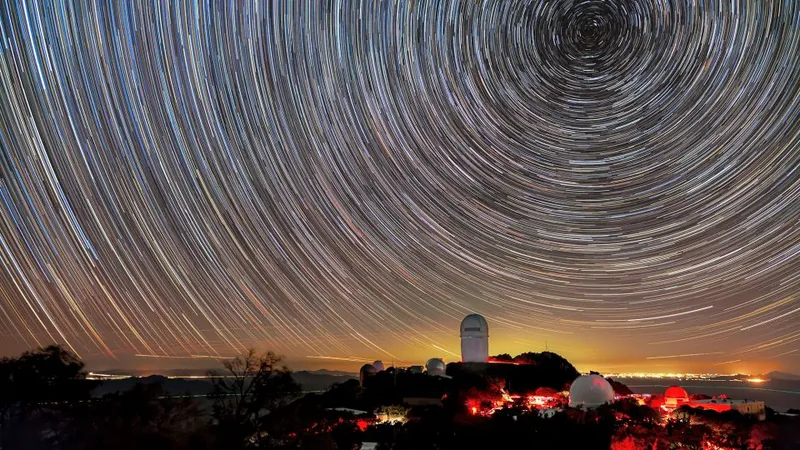
Is Dark Energy Changing? New Evidence Suggests a Shocking Evolution!
2025-04-02
Author: Jacob
Recent Revelations
Recent revelations from one of the most comprehensive cosmic surveys to date indicate that the enigmatic dark energy may be evolving, offering astronomers a potential paradigm shift in our understanding of the universe.
Understanding Dark Energy
Dark energy, which comprises approximately 70% of the universe's energy content, is an unidentified force believed to be responsible for the accelerated expansion of the cosmos. Despite its prevalence, scientists are still grappling with the fundamental nature of dark energy. Mustapha Ishak-Boushaki, a professor of physics and astrophysics at the University of Texas at Dallas and co-chair of the Dark Energy Spectroscopic Instrument (DESI) collaboration, emphasizes the importance of this research.
The DESI Collaboration
DESI, operating from the National Science Foundation’s Nicholas U. Mayall 4-meter Telescope in Tucson, Arizona, has been surveying the universe for four years. With the capability to observe light from 5,000 galaxies simultaneously, it is set to measure the light from around 50 million galaxies by the end of its project next year.
New Data Release
On March 19, the collaboration released new data from DESI's first three years, revealing measurements of nearly 15 million galaxies and quasars, which are among the universe's brightest objects. Ishak-Boushaki's analysis points towards a startling conclusion: dark energy, once considered a constant, is behaving unpredictably and may even be weakening over time.
A Shift in Understanding
David Weinberg, a professor of astronomy at The Ohio State University, described the discovery of dark energy nearly 30 years ago as the 'biggest surprise' of his scientific career. The latest findings suggest that dark energy's potential evolution could revolutionize our current cosmological framework.
3D Mapping of the Universe
The Dark Energy Spectroscopic Instrument utilizes its advanced technology to create a 3D map of the universe, documenting how dark energy has shaped cosmic evolution over the past 11 billion years. It achieves this by collecting light that has traveled vast distances, allowing scientists to witness the universe's past.
Implications of Evolution
Remarkably, the recent data includes over twice the number of cosmic objects compared to previous surveys, bolstering the hypothesis that dark energy may not be the constant force we once thought. The implications of this evolution are profound. If ongoing observations continue to support this theory, the way we understand the universe will undergo substantial revisions.
Baryon Acoustic Oscillation
The DESI team also investigates what is known as baryon acoustic oscillation (BAO) scale—patterns left in the cosmos' matter distribution from early universe events. Scientists use this fascinating "ruler" to measure cosmic distances and the universe's expansion rate. According to Paul Martini, a lead researcher in the DESI analysis, these measurements highlight dark energy's significant role throughout cosmic history.
Future Prospects
Emerging data suggests dark energy's influence could diminish over time, potentially leading to a halt in the universe's accelerated expansion. Ishak-Boushaki notes that if dark energy continues to weaken, it might not retain its status as the dominant force in the universe, possibly causing a future scenario where the cosmos ceases to expand and may even reverse direction—a process that will unfold over billions of years.
Cautious Optimism
Despite the compelling nature of the findings, researchers caution that definitive proof of evolving dark energy remains elusive. As measurements improve, scientists are motivated by the quest to unlock the mysteries of dark energy. The upcoming Spec-S5 experiment, expected to analyze over ten times the number of galaxies as DESI, along with other initiatives like the Euclid space telescope and the Nancy Grace Roman Space Telescope, promises to deliver further critical insights into dark energy and dark matter.
Ongoing Tensions
The intriguing results from DESI also highlight an ongoing tension between early universe measurements and modern observations, suggesting that a more intricate model of dark energy might be necessary to account for these discrepancies. As astrophysicists strive to decipher the complexities of the universe, scientists like Jason Rhodes from NASA's Jet Propulsion Laboratory are optimistic that the next few years could yield groundbreaking discoveries in cosmology.
A Journey into Understanding
If these findings consistently point toward the evolution of dark energy, humanity stands on the brink of monumental revelations regarding the cosmos—a journey into understanding the true forces that shape our universe!









 Brasil (PT)
Brasil (PT)
 Canada (EN)
Canada (EN)
 Chile (ES)
Chile (ES)
 Česko (CS)
Česko (CS)
 대한민국 (KO)
대한민국 (KO)
 España (ES)
España (ES)
 France (FR)
France (FR)
 Hong Kong (EN)
Hong Kong (EN)
 Italia (IT)
Italia (IT)
 日本 (JA)
日本 (JA)
 Magyarország (HU)
Magyarország (HU)
 Norge (NO)
Norge (NO)
 Polska (PL)
Polska (PL)
 Schweiz (DE)
Schweiz (DE)
 Singapore (EN)
Singapore (EN)
 Sverige (SV)
Sverige (SV)
 Suomi (FI)
Suomi (FI)
 Türkiye (TR)
Türkiye (TR)
 الإمارات العربية المتحدة (AR)
الإمارات العربية المتحدة (AR)